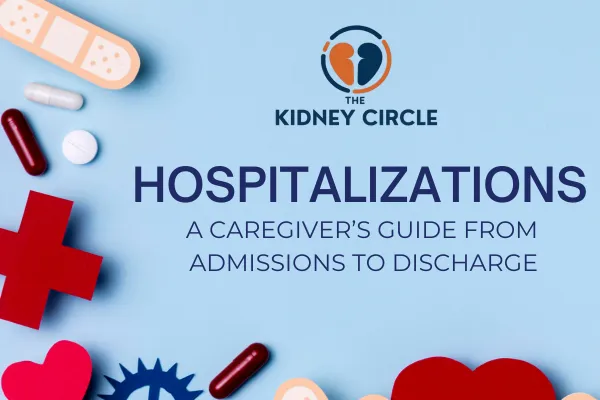
Hospitalizations: A Care Partner’s Guide From Admission to Discharge
Hospitalizations: A Care Partner’s Guide From Admission to Discharge
This guide gives you simple, doable questions and actions for each step—before admission, during the hospital stay, clarifying goals of care, and preparing for discharge. Quick notes in your Kidney Circle Care Planner will keep you organized, one conversation at a time.
Before you leave for the hospital, take a few minutes to gather essentials. Bring your loved one’s current medication list, recent lab results, insurance cards, and a photo ID, and some of your personal items like a phone charger, extra sweater, and some snacks (in another article, I detail what information should be gathered for an Emergency Room “Go-Bag.”)
At check-in, introduce yourself and set your role: “Hi, I’m the primary care partner. Here is their medical information. I’d like to be included in decisions. Who is coordinating their care today?” – “What’s the best number to reach the team caring for my loved one?” You’ve already started advocating effectively. Your notes don’t have to be perfect...jot down what matters.
For the daily check-ins during the stay, ask the staff: “What’s the plan for today? Who will see my loved one?” If new medical procedures or medications are ordered, ask: “Is this safe for someone with kidney disease?” Remember, if something seems off, trust your instincts and speak up: “This isn’t normal for them. Should we be concerned?” Capture quick notes in your Care Planner, for example: “Day 2: kidneys stable; new blood pressure med.”
Request a care conference and clarify goals. If you don’t understand the full picture, ask for a brief care conference. “Could we schedule a short meeting to understand the big picture and next steps?” Here are some key questions to ask: “What are the main goals for this hospitalization?” Given all their conditions, what does recovery realistically look like? How will these goals be shared with their nephrologist and primary care provider?” Let the team know you want to be included in decisions and notified before discharge is discussed. Document the goals, who is doing what, and when you will receive the next update.
Prepare for discharge early. As soon as discharge is mentioned, get clear answers. “What’s changed since admission? How are their kidneys and other conditions now? What new symptoms should we watch for at home, and when is it urgent? Who do we call first if we’re worried, and what number should we use?” Review all new medications with the staff and fill prescriptions before leaving. Ask for written home instructions, then update the Care Planner with any routine changes.
Phrases that help you advocate (anytime): “Can you explain that in a way I can understand—and I’ll write it down?” • “I’m worried about this. Can we talk through options?” • “That doesn’t sound right for them. Can we double‑check?”
You’ve got this! Your Care Planner can help you stay calm, feel in control, and help your loved one get the care they need—one conversation at a time. If you’d like help building a personalized hospital plan or organizing your Care Planner, contact kidneycircle.com. Kidney Circle can support you with checklists, scripts, and next-step planning.